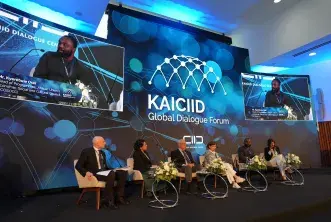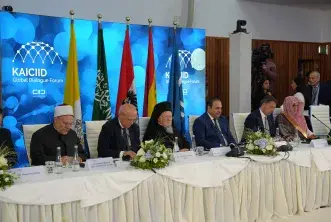By H.E. Dr. Zuhair Alharthi, Secretary General, International Dialogue Center - KAICIID
As the Secretary General of the only intergovernmental organization mandated to use interreligious dialogue to promote sustainable development, I talk often with global leaders about harnessing the power of religion to solve global crises.
The modern geopolitical landscape is fraught with challenges that no single government can manage alone. Not only are we living in the aftermath of a global pandemic, we are also grappling with the intensifying impacts of climate change and a crippling economic crisis. This is coupled with the highest number of violent conflicts since the Second World War.
This past month, the Peoples’ Climate Vote 2024, which is the largest-ever public opinion survey on climate change, revealed that 86 per cent of people globally are demanding their governments set aside geopolitical differences and address climate change. This overwhelming consensus emerges amidst rising nationalist sentiments and increasing geopolitical tensions.
Addressing the Global Displacement Crisis
Simultaneously, an estimated 120 million people worldwide – nearly double the number from a decade ago – are forcibly displaced, due to persecution, conflict and violence. In Europe, where KAICIID is headquartered, asylum applications have neared levels not seen since the 2015 refugee crisis. Millions have fled conflict in Afghanistan, Gaza, Syria and Ukraine, among others.
This alarming trend has profound implications for human dignity and the building of inclusive cities. Forced displacement places immense pressure on urban infrastructures, often leading to overcrowded housing, strained public services, and increased social tensions. Cities, traditionally seen as bastions of opportunity, are now at the forefront of integrating displaced populations while maintaining social cohesion.
It is against this backdrop that KAICIID hosted the Global Dialogue Forum last month in Lisbon, Portugal. We welcomed over 120 policymakers and religious leaders, as well as representatives from civil society, women and youth. Together, we focused on three key themes which are interwoven though most of today’s pressing global challenges: promoting sustainable peace processes, tackling the impacts of climate change and building inclusive cities.
The Need for Transformative Dialogue
Throughout these discussions, one idea rang clear: the breakdown in multilateralism, evident in fragmented and self-seeking responses to global crises, demands a revitalization of international cooperation with a commitment to human dignity at its core. What is the most effective tool that we have to achieve this? Transformative dialogue.
Global development agendas call for a world that thrives on equality, justice, and environmental stewardship. However, achieving these ambitions requires more than just political will and financial investment; they call for a transformation in the hearts and minds of individuals and communities around the globe.
That’s why, at the end of the Forum, I was pleased to see individuals and organizations commit to take forward KAICIID’s Transformative Dialogue Initiative – committing to use dialogue to further their sustainable development work across the globe.
Emphasizing Human Dignity
Dialogue motivates policymakers and religious leaders to FIRST emphasize our common humanity as the foundation for sustainable development and peacebuilding. This recognition is crucial for creating inclusive policymaking processes that involve all segments of society, including marginalised and indigenous communities.
Dialogue can mitigate many of the threats to sustainable peace, including the feeling that grievances are unmet and unresolved, the continued perpetration of human rights violations, particularly against minority groups, and the lack of psychological support in post-conflict recovery.
However, dialogue extends beyond conflict mediation and resolution. It also supports communities affected by mistrust and polarisation. Instead of excluding identities, it expands trust and relationship building. In this way, transformative dialogue encompasses universal human rights principles ensuring the inclusion of frequently marginalised voices, such as those of women, youth and minorities.
Spiritual and Ethical Implications of Sustainable Development
The Forum’s focus on the spiritual and ethical implications of sustainable development brings a unique depth to the discourse, often missing in wholly secular conversations. By engaging religious leaders and communities, we aim to facilitate a broader, more inclusive dialogue that leverages moral and ethical leadership to drive change. This ensures that sustainability is not just a technical target but a deeply embedded social commitment.
No other force is rooted deeper in the human collective consciousness than religion and spirituality. Religion informs the individual preferences and identities of eighty-five percent of the world's population, which in turn impacts institutional and social norms around the world.
By ignoring or underestimating the profound influence and role of religion – and thereby interreligious dialogue – global leaders diminish its tremendous potential to contribute to positive economic, geopolitical, cultural and social change.
By continuing to engage in transformative dialogue, we empower ourselves and others to make informed, compassionate decisions that benefit all. The path to global harmony is one we must walk together with courage and unwavering dedication to human dignity.




